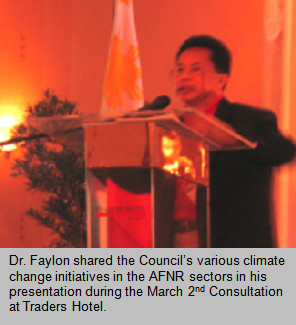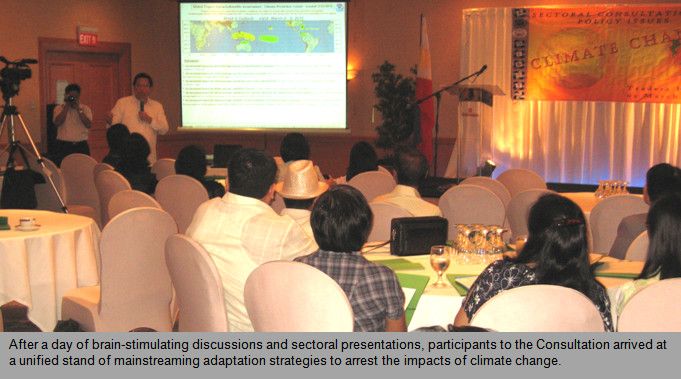 As the country gears for hotter and then wetter days ahead, representatives of the country’s science community gathered for the Department of Science and Technology (DOST) Sectoral Consultation on Policy Issues on Climate Change held recently at the Traders Hotel in Manila.
As the country gears for hotter and then wetter days ahead, representatives of the country’s science community gathered for the Department of Science and Technology (DOST) Sectoral Consultation on Policy Issues on Climate Change held recently at the Traders Hotel in Manila.
Participants included some members of the PCARRD directorate and senior staff led by Executive Director Patricio S. Faylon, with support from Deputy Chiefs, Danilo C. Cardenas and Richard M. Juanillo.
Along with PCARRD, other DOST councils and institutions were represented. These included the Philippine Atmospheric, Geographysical and Astronomical Services Administration Services (PAG-ASA) and the research and development (R&D) councils for aquatic and marine (PCAMRD), advanced science and technology (PCASTRD), health (PCHRD), and industry and energy (PCIERD).
The National Research Council of the Philippines (NRCP) and the National Academy of Science and Technology (NAST) were also represented.
DOST calls for policy confab
Members of the science community were tasked to arrive at a common stand on policy recommendations on global warming. The resulting discussions were essential to the country’s initiatives in relation to the climate change roadmap of the Association of South East Asian Nations - Committee on Science and Technology (ASEAN-COST).
Specifically, the daylong consultation and workshop sought to formulate policies toward the “achievement of the strategic context set forth in the ASEAN-COST regional S&T Roadmap on Climate Change for 2010-2015 towards a resilient Philippines”.
The activity opened with a message from NAST President Emil Q. Javier, and a keynote address of DOST Undersecretary (USEC) for R&D Graciano P. Yumul, Jr.
In his message, Dr. Javier stressed the extreme vulnerability of the country owing to our high dependence on natural resources. Any changes in climate, he said, would exacerbate the already fragile ecosystems.
He then urged for those gathered to examine the various options available to us, to adapt these options and to promote them locally. Finally, to ensure that such actions are institutionalized, Javier pushed for the mainstreaming of climate change adaptation in the local governments.
For his part, USEC Yumul emphasized that the Philippines co-chairs ASEAN-COST with Vietnam. He then said that the science community should thus arrive at policy recommendations in the context of disaster risk management and adaptation to climate change.
Yumul also stressed that a balance must be struck between adaptation and mitigation initiatives. He mentioned that both options are feasible and we should not be forced to choose between them. Finally, he identified the possible constraints to any efforts to mainstream.
Foremost among these, Yumul said, is the apparent disconnect between national government and local government units caused by lack of coordination. This disconnect eventually leads to duplication of efforts. Also, levels of awareness on climate change vary while uncertainty exists regarding the roles of stakeholders.
Sectors in plenary
 To set the tone for the simultaneous sectoral workshops to follow, several papers were presented in plenary. Dr. Faylon led the presentations with PCARRD’s initiatives on climate change in the agriculture, forestry and natural resources sectors.
To set the tone for the simultaneous sectoral workshops to follow, several papers were presented in plenary. Dr. Faylon led the presentations with PCARRD’s initiatives on climate change in the agriculture, forestry and natural resources sectors.
Faylon elaborated on the response mechanisms that the Council has developed with the National Agriculture and Resources Research and Development System, specifically the S&T-based rehabilitation of calamity-stricken areas in the country and the analysis of climatic risk and coping strategies in major corn-growing areas in the Philippines.
Finally, Faylon enumerated the future directions for the Council, especially on policy and institutions, and on vulnerability and impact assessment. On the former, PCARRD will examine the role of local institutions and their interaction in climate risk management while defining their strengths and weaknesses. Also, it will seek to strengthen existing local institutions and building inter-local linkages.
On the latter, the Council will determine climate change impacts on and assess vulnerability of various agricultural and forest ecosystems and other environmental services. It will also work on improving the early warning and response systems.
Following Faylon in turn were representatives from the various sectors: Mr. Nonilo A. Peña (energy), Dr. Irma R. Makalinao (health), Dr. Nathaniel T. Servando (disaster management and advanced science), and Dr. Profirio M. Aliño (coastal and marine).
Each speaker covered the accomplishments within their respective sector to date and where the gaps and challenges are. All closed by pointing out possible next steps and options – these presentations then guided the conduct of sectoral workshops.
Agreeing on policy
Each plenary presenter chaired his/her respective sector’s working session to look at the policy issues affecting their sector. Specifically, they were asked to focus on four major issues: technology transfer, adaptation strategies, risk management efforts and decision support systems.
While the agriculture, forestry and environment group identified several issues along the major themes, they emphasized the need to determine the gaps in existing policy on climate change. The group further agreed that any study on climate change should take a broader perspective, especially when considering national development.
On the aspect of technology transfer, the group held that technology choices should consider socioeconomic characters of different stakeholders. At the same time, the source of technology choices should range from basic to advance sciences while a multidisciplinary approach must be adopted in the development of such choices.
For issues on adaptation strategies and risk management, the group recognized the need for an appropriate mechanism for information sharing and knowledge management. In developing such a mechanism, they stressed that inputs from different agencies/sectors must be integrated.
Finally, the group pointed to the need to strengthen and/or refine decision tools by making available useful maps. As well, they said that decisions would be facilitated by the availability of reliable local climate data.
The Common Stand
All the sectors identified three common problems. These are:
1. Disconnection, lack of coordination, and duplication of efforts
2. Uncertainty regarding roles of stakeholders
3. Lack of baseline information, data maps of vulnerable areas
As the day came to a close, representatives from all sectors then recommended the mainstreaming of adaptation strategies. The body further agreed that in order to do this, the R&D framework and climate change agenda must be institutionalized. Wide-scale vulnerability and impact assessments must be done.
Furthermore, appropriate and culturally rooted strategies including indigenous technologies must be developed alongside the strict implementation of laws and regulations. Finally, information, education and communication campaigns must be community-based while climate change should be integrated in the curriculum as well as in textbooks.
Moving Forward
NRCP Prexy and Philippine Council for Health Research and Development Executive Director Jaime C. Montoya said that the conference was the first step in a series of forums. He also intimated that the outputs from the workshop would be presented at the 10th Science Council of Asia to be held on June 16─18, 2010 at the Sofitel Hotel also in Manila.
The science community has found a common ground. What strengthens this common stand is that everyone participated and a consensus was reached. The science community has taken the first steps towards adapting or mitigating climate change in the country. As the conference closed, everyone kept in mind a saying of Bertolt Brecht that was shared by Dr. Makalinao, “The aim of science is not to open the door to infinite wisdom, but to set a limit to infinite error.”
